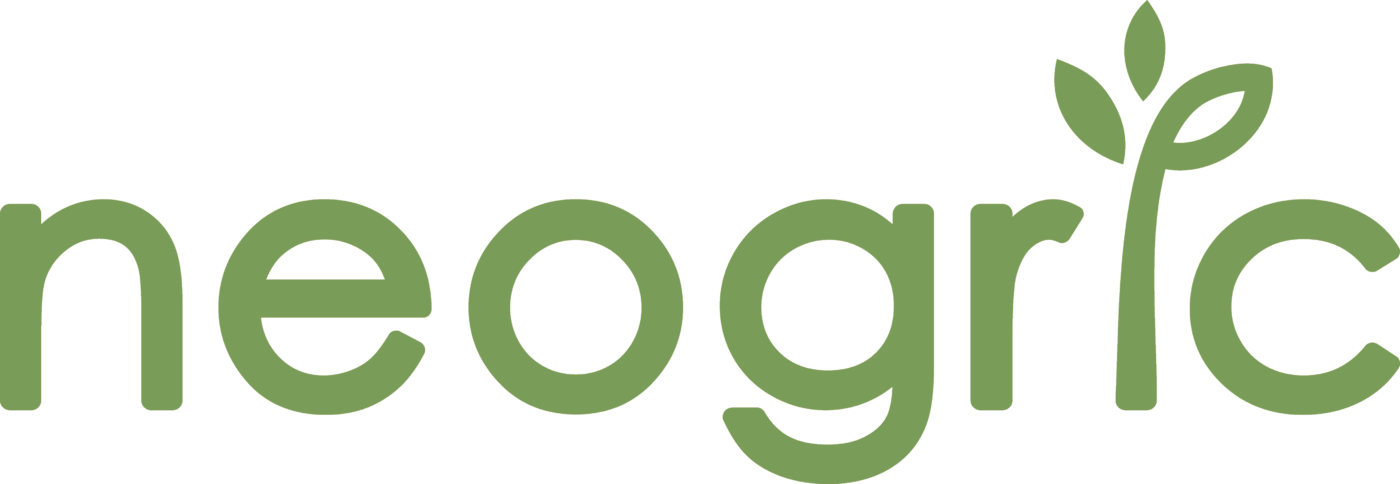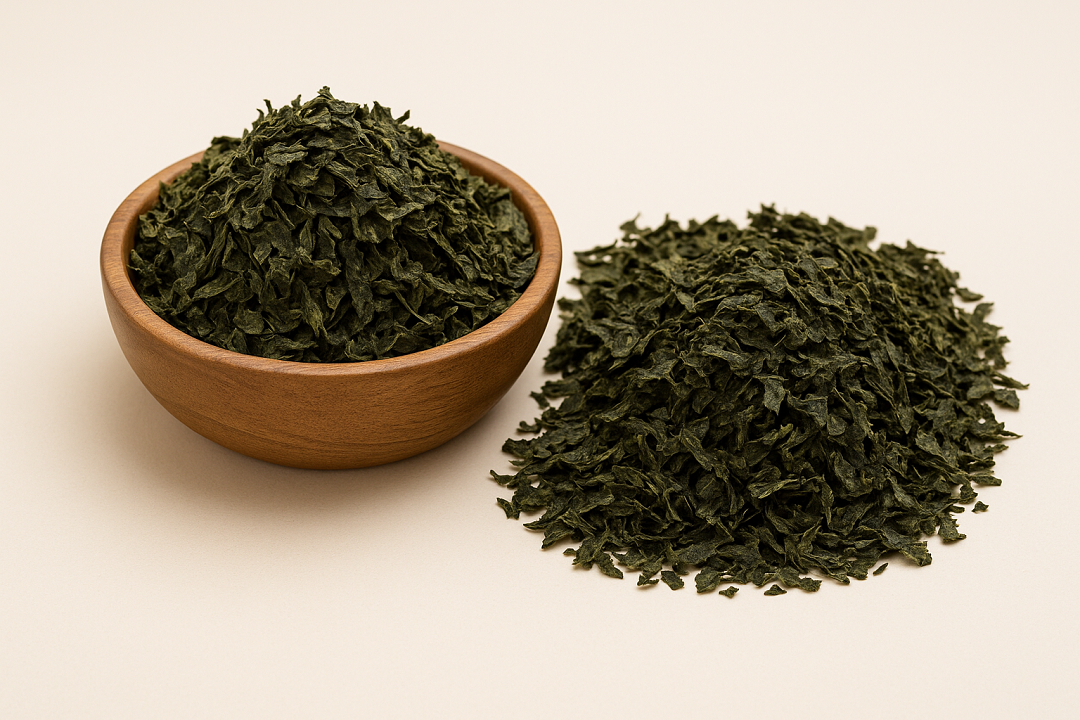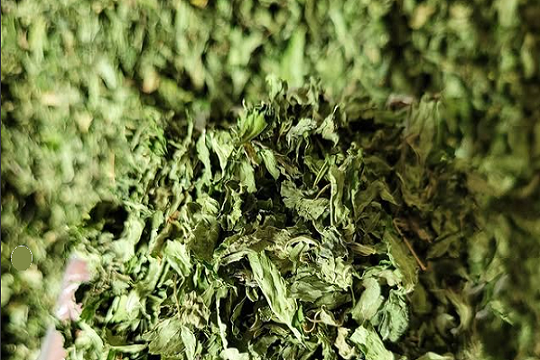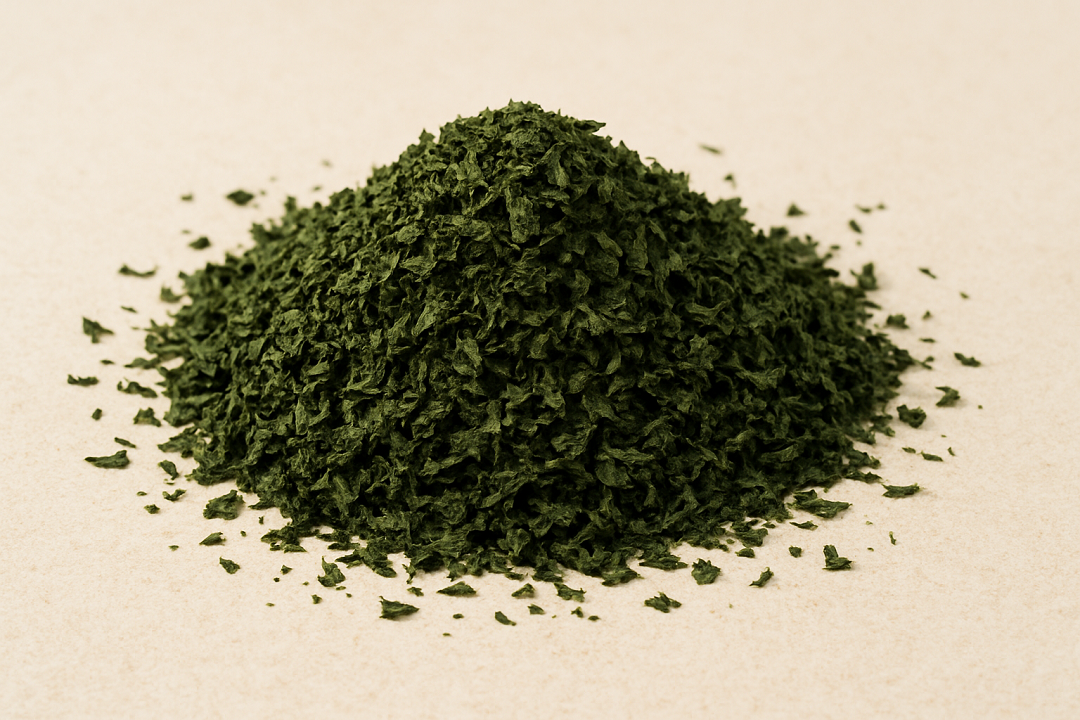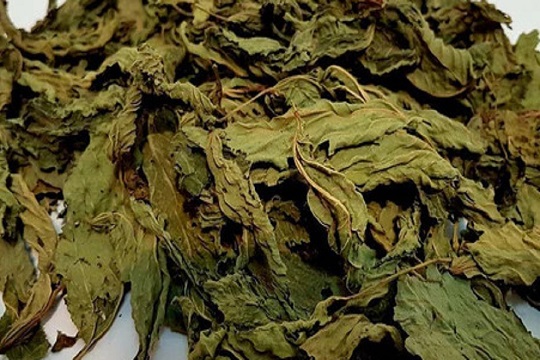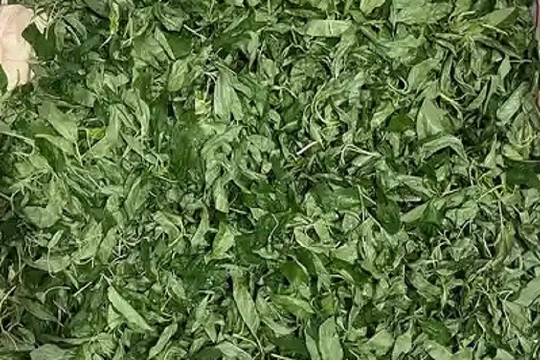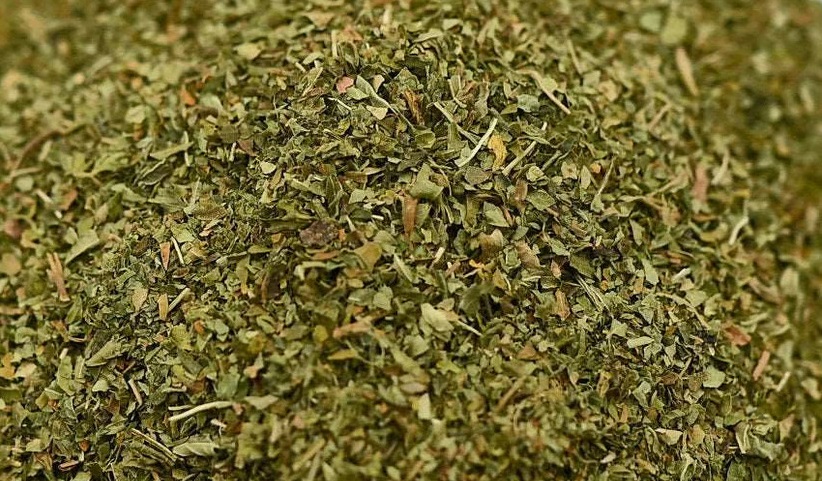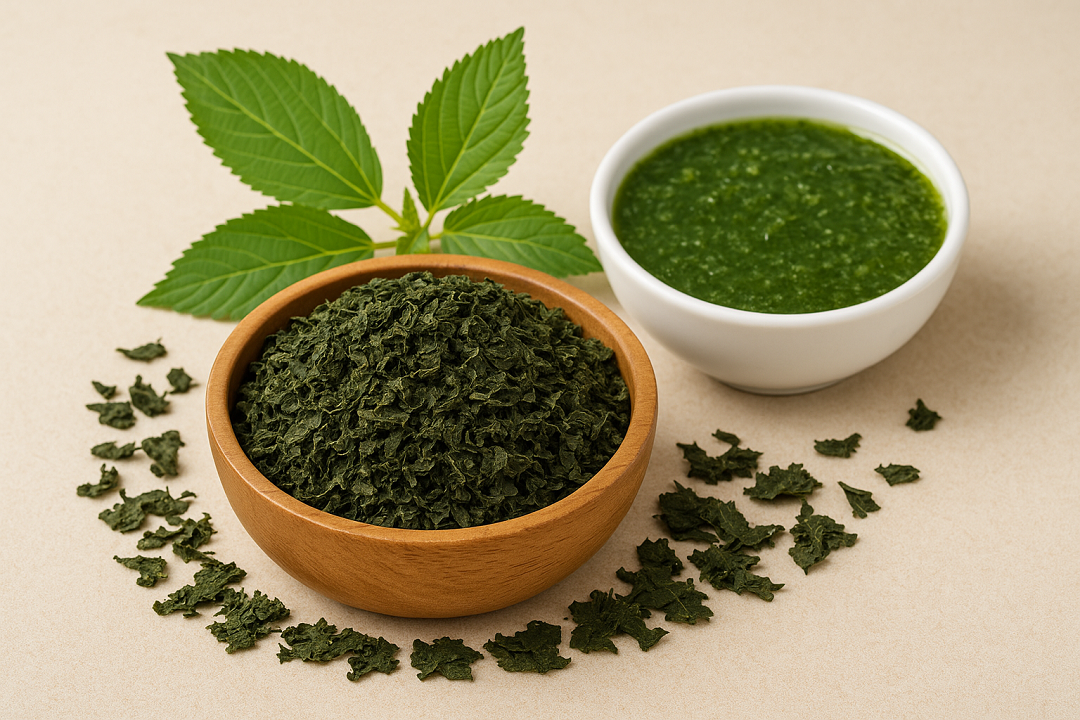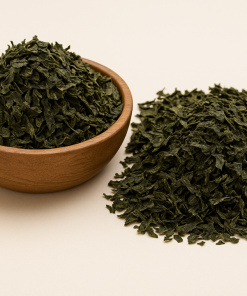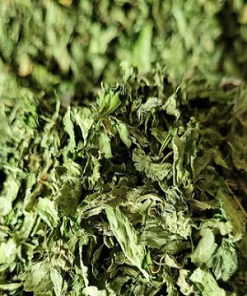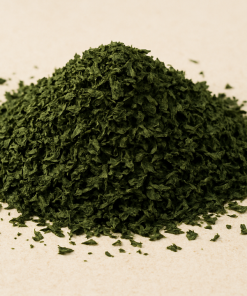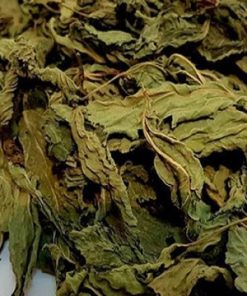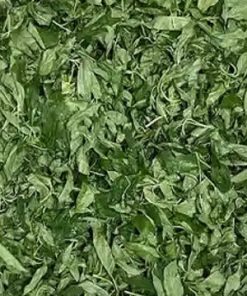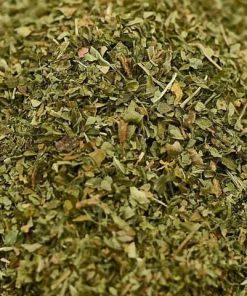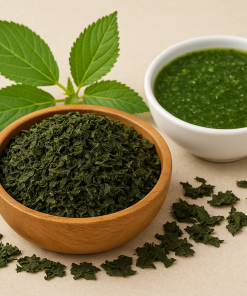What is Dried Jute Leaf (Ewedu)? Why Buy It?
Dried Jute Leaf (Ewedu) is a nutrient-rich leafy green derived from the jute plant, scientifically known as Corchorus olitorius. Commonly consumed across West Africa, the Middle East, and parts of Asia, Ewedu is most popularly recognized in Nigerian cuisine, where it plays a vital role in traditional meals. When fresh jute leaves are dried – typically under hygienic, sun-dried, or mechanical drying conditions – they transform into a shelf-stable product that retains much of its nutritional value and flavor, making it convenient for both local use and international export.
Ewedu is renowned for its mucilaginous (slimy) texture, which adds a unique consistency to soups and sauces. The dried form is highly desirable due to its extended shelf life, ease of transport, and suitability for global markets where fresh Ewedu is unavailable or difficult to preserve.
From a nutritional standpoint, Dried Jute Leaf (Ewedu) is an excellent source of vitamins A, C, and E, as well as calcium, iron, potassium, and antioxidants. It contains dietary fiber, polyphenols, and plant-based proteins, making it a superfood in many health-conscious communities.
Economically, Dried Jute Leaf (Ewedu) is a high-value commodity, particularly in African and diasporic markets where demand is steadily growing due to increased awareness of its nutritional and culinary benefits. Additionally, its role in traditional medicine and emerging markets in vegan and organic food industries enhances its global appeal.
Applications/Uses of Dried Jute Leaf (Ewedu)
Dried Jute Leaf (Ewedu) is a multifunctional ingredient utilized in diverse ways across several industries:
Food Industry
Traditional Cuisine
In Nigeria, Dried Jute Leaf is rehydrated and cooked into a viscous soup often paired with meals like amala, fufu, or eba. It is typically flavored with locust beans, ground crayfish, and seasonings.
In Egypt, a similar jute leaf soup called molokhia is consumed with rice, chicken, or bread.
Other parts of the Middle East and Asia use the leaf in soups, stews, and broths.
Health-Conscious and Vegan Meals
Due to its high micronutrient content, Ewedu is increasingly used in plant-based and vegan recipes, including smoothies, health drinks, and green sauces.
Its slimy consistency also makes it a desirable thickening agent in soups and gravies.
Convenience Food Products
Dried Jute Leaf is packaged in powdered or flake form for instant meal prep, especially for export markets.
Ready-to-cook Ewedu soup packs are now sold globally in ethnic food sections.
Nutraceutical and Health Supplement Industry
Digestive Health
The mucilage in Ewedu aids digestion and helps in soothing gastrointestinal inflammation.
Immune System Support
Its high antioxidant and vitamin content contributes to immune system function, helping the body ward off infections.
Bone and Eye Health
Calcium and vitamin A found in Ewedu support bone strength and vision health.
Weight Loss and Detoxification
Due to its fiber content and low-calorie profile, Ewedu is often recommended in weight-loss and detox regimens.
Herbal and Traditional Medicine
Traditionally, Ewedu is used to treat ailments such as fever, inflammation, and skin irritations.
In some African and Asian cultures, Ewedu leaf tea is consumed for general wellness and to boost vitality.
Cosmetics and Personal Care
Skincare Products
The antioxidant and vitamin-rich profile of Dried Jute Leaf extract is used in some herbal cosmetic products aimed at skin rejuvenation and anti-aging.
Haircare
Used in natural shampoos and hair masks for conditioning and scalp nourishment.
Agricultural and Environmental Uses
Animal Feed Supplement
Dried Jute Leaf can be added to animal feed to enhance nutritional content, particularly in small livestock farming.
Soil Fertility Enhancement
After reprocessing, Jute plant residues—including leaves—are used in composting for organic farming.
Top Producing/Exporting Countries of Dried Jute Leaf (Ewedu)
The production of Dried Jute Leaf (Ewedu) thrives in tropical and subtropical climates, where the jute plant flourishes. Below are the top producers and exporters of this commodity:
Nigeria
Nigeria is the largest producer of Ewedu in the world. The plant is cultivated across various regions, especially in the South-West and North-Central zones. Nigerian exporters are capitalizing on increasing diaspora demand by processing and packaging Dried Jute Leaf for markets in North America, Europe, and the Middle East.
Egypt
Known for its culinary use of molokhia, Egypt has a longstanding tradition of jute leaf farming.
Egyptian processors export both dried and frozen jute leaves, particularly to Mediterranean countries.
Sudan
Sudan produces substantial quantities of jute leaf for both local consumption and regional trade. It exports dried versions to neighboring African and Middle Eastern countries.
India
Though primarily known for fiber production, India grows Corchorus olitorius for food and herbal purposes. Some Indian suppliers export dried leaf powder and herbal formulations using jute leaves.
Bangladesh
Like India, Bangladesh traditionally focuses on jute fiber, but it has started exploring food-grade applications of the jute leaf. Emerging exporters are supplying small quantities of dried leaves to South Asian communities abroad.
Ghana
Jute leaf is cultivated in Ghanaian agro-ecological zones for local use and small-scale export to neighboring West African countries and diaspora markets.
Togo and Benin
These countries, though smaller producers, contribute to the regional trade of Dried Jute Leaf within West Africa and to global African markets.
Top Importing Countries of Dried Jute Leaf (Ewedu)
Global demand for Dried Jute Leaf (Ewedu) continues to grow, driven by the African diaspora, vegan health enthusiasts, and culinary interest in superfoods.
United States
The U.S. is a major importer, with African, Middle Eastern, and Asian grocery stores stocking Dried Jute Leaf. Nigerian communities in cities like Houston, New York, Atlanta, and Washington D.C. drive much of the demand.
United Kingdom
The U.K. has a vibrant West African population that regularly consumes Ewedu.
British importers source dried Ewedu in flake and powdered form from Nigeria and Egypt.
Canada
With growing African and health-conscious communities, Canadian importers cater to retail and online markets.
Saudi Arabia and UAE
Countries in the Gulf region import Dried Jute Leaf primarily for Egyptian and Sudanese populations. Ewedu is also sold in herbal markets and health food stores.
Germany and France
Home to significant African immigrant populations, these countries see consistent demand for Dried Jute Leaf, especially in multicultural food markets.
Australia
Increasing African and Middle Eastern immigration has prompted retailers to stock traditional dried vegetables, including Ewedu.
South Africa
Ewedu is sold in African grocery stores in Johannesburg and Cape Town, meeting local and immigrant community needs.
International Price of Dried Jute Leaf (Ewedu) Per KG
The unit price ($ per KG) of Dried Jute Leaf (Ewedu) in the international market depends on a host of different factors including:
- The grade of the produce (usually the more the processing, the higher the price)
- The price of the raw material
- Age of the seeds (this can affect the price)
- Production levels in producing countries
- Economic conditions and the exchange rates between the currencies of the producing and importing countries.
- The quantity ordered (the greater the quantity, the cheaper you can get it per ton)
- Harvest season (it is more costly when it is out of harvest season).
- Weather conditions (some commodities are sensitive to weather conditions).
- Freight & haulage cost
- Percentage of markup
- Import duties, trade tariffs and trade agreements between countries
- Distance from the country of origin
- Technology/Infrastructure available in country of origin
- Relationship between the buyer and seller
That said, as at March 2025, Dried Jute Leaf (Ewedu) costs between $5 and $10 Per KG in the international market.
How To Safely Source for Your Dried Jute Leaf (Ewedu) Produce
If you find the right export company, buying directly from them can make the purchase process easy and stress-free, when compared with doing the sourcing on your own. That said, there are few things to note when dealing with an export company in Nigeria or Africa. The specific requirements for Nigeria are listed below, but they mostly apply to other African countries:
- The exporting company must be registered with the Corporate Affairs Commission (CAC) to make sure the company is registered and permitted to carry out business
- The export company must also be registered with the Nigerian Export Promotion Council (NEPC).
- The company must possess a domiciliary account to accept international
The company should get all necessary export-related documentation done before the shipment leaves the port of origin. Some of the documents are:
- Certificate of origin
- Bill of lading
- Inspection Certificate (SGS, Cotecna, Bureau Veritas, Intertek, etc)
- Phytosanitary certificate
- Fumigation certificate
Where To Find Reliable Exporters
An important question that still needs to be answered is how to find Dried Jute Leaf (Ewedu) exporters in Nigeria. You can use any of the methods listed below:
- Attend trade fairs
- Use search engines like Google, Yahoo,
- Search for agents on Linkedln
- Sign up on trade platforms (e.g. Alibaba, Tradeford, Go4WorldBusiness)
- Neogric – Neogric is one of the reliable Dried Jute Leaf (Ewedu) exporters in Neogric is rated among the best in the exporting business in Nigeria. The company is not limited to the exportation of Dried Jute Leaf (Ewedu) alone but can export other agricultural produce ranging from perishables to dry seeds.
How To Pay For Your Dried Jute Leaf (Ewedu) Produce
You can pay for Dried Jute Leaf (Ewedu) using different methods, but three of the popular ways of paying for your agric produce are:
- Bank (T/T) Payment
- Advance Payment
- Letter of Credit (LC)
Bank Payment (T/T)
Bank payment is also known as T/T, “Telegraphic Transfer” or “Telex Transfer” In other words, it is an international wire of funds from the buyer’s bank to the seller’s bank.
A T/T is technically not the same as a wire transfer, which is often done through the SWIFT network. However, when a seller or supplier asks for a T/T payment, a wire transfer is what they are really asking for.
The wire transfer based on the SWIFT system is the most common payment method in international trade. Typically, it takes 1-5 working days to clear, and generally costs between 25 and 50 USD, depending on your agreement with the commercial department in your bank.
Advance Payment
There are sellers that will demand anywhere from 30% to 50% advance payment, and for good reason. If both parties have done deals in the past, sellers can ask for a percentage of the sales (about 30%) before they ship the produce and they can request for the remaining amount after a scanned copy of the Bill of Lading has been sent to the buyer.
It is the safest option for exporters and it also guarantees that they will have some funds to help with sourcing. It is popular among manufacturers on B2B marketplaces like Alibaba and also with commodity traders.
However, advance payment carries considerable risk for the importer (buyer) because the exporter (seller) might not be under as much pressure to ensure quality checks compared with a stricter form of payment. Some might even disappear entirely.
Having said that, advance payment is very useful and is widely used. For instance, the seller might need to secure the commodity in the face of increased competition. It can also be used when the exporter needs some money for sourcing the produce or for processing raw materials.
The most important thing is for both importer and exporter to build mutual trust by having a track record of successful deals with each other or other known companies.
Letter of Credit
Letter of Credit is an agreement generated by the bank of the buyer, guaranteeing payment once certain conditions are met. It is one of the safest types of payment available to both buyer and seller.
Some of the types of Letter of credit are:
- Commercial Letter of Credit,
- Sight Letter of Credit
- Transferrable or Non-Transferable Letter of Credit
- Standby Letter of Credit (SBLC)
- Usance or Deferred Payment Letter of Credit
- Revocable or Irrevocable Letter of Credit
- Confirmed or Unconfirmed Letter of Credit
- Revolving Letter of Credit
- Green Clause Letter of Credit
- Red Clause Letter of Credit
L/Cs are not totally safe (for either buyer or seller) too. For instance, sellers can ship substandard products or those that are different from the ones agreed upon. In this case, the seller gets paid and the buyer receives goods he cannot use.
And speaking of the dangers of L/Cs for the exporter, the conditions in the Letter of credit might be practically impossible to fulfil; if an exporter agrees to such, he might be unable to receive payment. A report stated that of the letters of credit received in the UK, 50% are unworkable while 70% are rejected by the banks for payment.
Shipping & Delivery Terms
When shipping your products, it is important to take note of a few factors:
Order Quantity
For smaller shipments, airfreight is often the preferred option but as the order volume increases, sea freight could become significantly cheaper. Usually when the order is close to a full container load (20 ft), sea freight is used. Although the Covid-19 pandemic caused an increase in cost of delivery of products, prices have stabilised.
Cost of Delivery
When the order is of a large volume, sea freight often turns out cheaper than air freight. In fact, air freight could be up to 6 times more costly than sea freight if the volume is large enough.
Time of Delivery
Sometimes, time will be more important to the buyer than the cost of delivering the product. In this case, air freight will be the logical option (as stated above, the cost will be more). But if you have more time as a buyer, you should strongly consider using sea freight.
Incoterms
Incoterms refer to generally accepted shipping and payments terms. For example, buyers that have representatives in the source country or that can negotiate with the freight company can use the Free of Board (FOB) terms, since it gives them more control and can save them some money.
However, if the shipment is small or the buyer doesn’t have an extensive network to effectively handle payment for freight, insurance and port charges, he will be better off choosing the Cost-Insurance-Freight (CIF) payment option.
Neogric: Top Exporters and Suppliers of Dried Jute Leaf (Ewedu)
We invite you to place your order for high-quality Dried Jute Leaf (Ewedu) with us at Neogric. We are a trusted global commodity sourcing and trade solution provider with deep expertise in the Dried Jute Leaf (Ewedu) industry. Whether you’re a small business or a large corporation, our wide range of products and technology powered, end-to-end supply chain make the export of quality Dried Jute Leaf (Ewedu) easy, quick and safe. Whichever region of the world you are, be it Europe, Asia, USA, Canada, Other North/Central American countries, Africa, South America or Oceania, you can reliably order your agricultural produce and we will ensure it is successfully delivered to you, on time.
Why Buy Dried Jute Leaf (Ewedu) From Neogric?
Choosing Neogric as your Dried Jute Leaf (Ewedu) supplier offers several advantages:
- Quality Assurance: We maintain strict quality control standards, ensuring our Dried Jute Leaf (Ewedu) and other products are of the highest quality.
- Wide Product Range: We offer a diverse selection of products, catering to various
- Reliable Supply Chain: Our efficient technology-powered end-to-end supply chain ensures timely delivery of your orders.
- Expertise and Support: Our team of experts provides valuable insights and support, making your purchasing process smooth and hassle-free.
Our Dried Jute Leaf (Ewedu) Trade Specifications
- Origin: Nigeria
- Product Name: Dried Jute Leaf (Ewedu)
- Physical Specification: Based On Buyer’s Specification
- Quantity: Based On Buyer’s Specification
- MOQ: 10 Metric Tonnes
- Trade Process: Ex Works/FOB/CIF
- Admixture/Impurities: Based On Buyer’s Specification
- Inspection: SGS/Cotecna/Intertek/Bureau Veritas
- Packaging: Based On Buyer’s Specification
- Payment Method: TT (Bank Transfer) or L/C
- Shipping Time: 15 to 25 Days After Confirmation of TT or L/C
- Loading Port: Lagos (Nigeria), Abidjan (Cote D’ivoire) or Tema (Ghana)
Expected Shipping Documents
- Bill of Lading
- Certificate of Origin
- SGS Inspection Certificate
- Phytosanitary Certificate
- Fumigation Certificate
- Commercial Invoice
- Packing List
Place Your Dried Jute Leaf (Ewedu) Order With Neogric
Contact us today to place your order for high-quality Dried Jute Leaf (Ewedu). Our team is ready to assist you with all your procurement needs.
- Tel: +2348147860157
- Email: neo@neogric.com
- WhatsApp: Chat With Us
